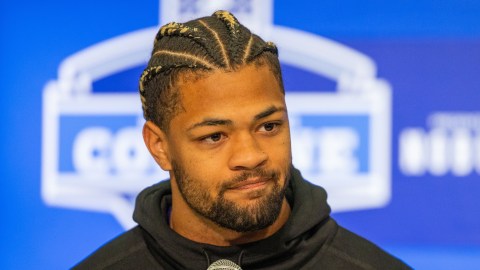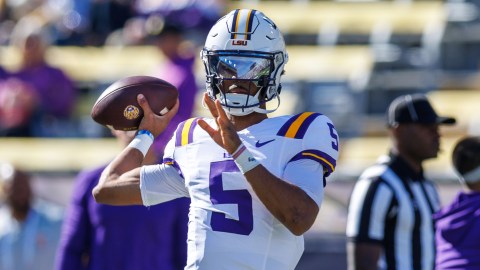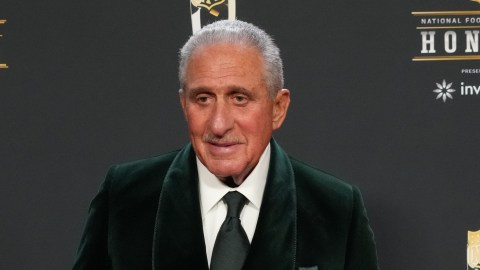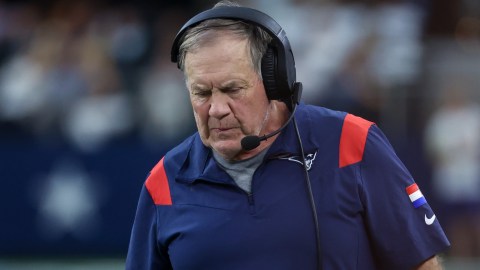The NFL has come under fire for overprotecting its marquee quarterbacks with the implementation of the "Brady rule" this season. Detractors felt that it elevated the quarterbacks above the game and that big-name, big-money stars were being treated differently.
However, now the NFL is expanding its injury-related regulations again with new stringent concussion rules for all players.
Last week, Pittsburgh Steelers wide receiver Hines Ward found himself mired in controversy after criticizing his teammate, quarterback Ben Roethlisberger, for not playing with post-concussion symptoms. Roethlisberger took a knee to the head during the Steelers' Week 11 loss to Kansas City and was diagnosed with a concussion.
Previously, the rule stated that a player can return to a game after sustaining a concussion "if he is asymptomatic at rest and under exertion, and is cleared by the team doctor." NFL commissioner Roger Goodell has changed the rule and issued a league-wide memo stating that if a player is "woozy, has general dementia or memory loss," he will not be allowed to return to the game.
This seems like common sense when viewed from a health standpoint. Why then do players like Ward criticize teammates for not playing hurt?
Former NFL offensive lineman Ross Tucker weighed in on this topic for Sports Illustrated last week. Tucker makes the distinction between playing through a visible, tangible injury — such as a broken finger, hyperextended knee or contusion — and playing with a concussion. Concussed players, unless they are knocked completely unconscious, usually look fine. There is no outward trauma and no visible negative reaction. Players often practice and scrimmage with concussions. To complicate matters, they also often lie to or mislead team doctors and training staff because of the NFL's code of playing hurt.
As Tucker writes, it is expected that players will play through injuries. Football is a sport built largely on machismo, and playing with an injury is expected and respected. Because of the NFL’s notoriously weak player's union and the lack of job security, players are conditioned to act in a manner that will have them on the field, no matter the ultimate price, even in regards to their health.
Concussions have a long and storied history in the NFL, and they've ended many careers. Former Cowboy and current broadcaster Troy Aikman ultimately retired because the number of concussions he suffered in his career (as many as 10) left teams unwilling to take a chance on a quarterback whose durability was a question.
Former Patriot Ted Johnson is a far more tragic case. Suffering from post-concussion syndrome and depression, Johnson's life fell apart. Addicted to amphetamines, Johnson took many hits, both physically and emotionally.
"Officially, I've probably only been listed as having three or four concussions in my career," Johnson told The Boston Globe. "But the real number is closer to 30, maybe even more. I've been dinged so many times I've lost count."
Then, there is former Jets wide receiver Wayne Chrebet who, after suffering multiple concussions in his 11-year career, was eventually forced to retire in 2005. In a 2007 New York Times piece, Chrebet spoke of watching then-Lions quarterback Jon Kitna return to the game after sustaining a concussion.
“I saw his eyes on the sideline, and I know that look because I’ve seen it on my eyes and other players," he told the Times. "I disagree with what they did. I’m sure he wanted to go back in, and I’m sure he told them that. But I think they have to look at the best interest of the player.”
That kind of incident is specifically what Goodell is hoping to put an end to with the implementation of the new concussion rule.
Perhaps more than any other sport, professional football is hardest on the human body. Players retire and live with constant pain for the rest of their lives. Many are unable to walk without help, and in some more serious cases, such as Johnson's, the fallout is much more severe.
However, despite the brutal and violent nature of the sport, the NFL protects its players physically much less than the other major professional sports. The NHL has seen a drastic reduction in concussions and head injuries because of harsher penalties for checking from behind, the behavior most likely to result in head injuries. And in Major League Baseball, despite resistance from players, Rawlings is intending to introduce a newer, more protective batting helmet that can withstand the force of a 100-mph fastball. All the while, football players continue to play with dangerous head injuries because they are hardwired to believe they should.
This problem extends beyond the NFL into the NCAA and high school levels. A report by the Journal of Athletic Training estimates around 55,000 concussions are sustained each year by high school players. Unlike in college or the NFL, high school teams do not have the team doctors and trained medical staff to properly diagnose and treat a concussion. As a result, some of these injuries have turned deadly.
There is hope that the implementation of the new NFL concussion rule will have a trickle-down effect to college and high school teams and that players, coaches and training staffs will err on the side of caution regarding head injuries. But if that is to happen, the NFL needs to be on board. Players and training staffs must be willing to be on the same page, and players must be honest with team doctors about what effects they may or may not be feeling. To do that, players need to feel that their jobs are secure and that there is no need for them to play with a dangerous and debilitating head injury to ensure their position on the team. They also need to have the support of their teammates.
While Ward later backed off his assertions that at least "50 percent" of Steelers players thought Roethlisberger should have played last week, he set a dangerous precedent in complaining about a teammate’s injury. Because of their very nature, concussions are unpredictable injuries, and everyone recovers from them differently. The NFL has taken an important first step in protecting all of its players' physical well-being, but there is more work to be done in changing players' attitudes.



